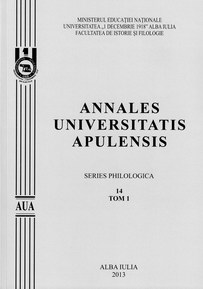Écriture et éxcentricité : le cas des Illuminés de Gérard de Nerval
Writing and eccentricity: the case of Les Illuminés by Gérard de Nerval
Author(s): Elena Mihaela AndreiSubject(s): Literary Texts
Published by: Universitatea »1 Decembrie 1918« Alba Iulia
Keywords: eccentric text; eccentric writing; digressive unity; dissipative structure; concentrated eccentricity; spread center
Summary/Abstract: There are undoubtedly many ways to analyze the relationship between writing and eccentricity and to highlight the po(i)ethic particularities of eccentric writing and text in the case of Les Illuminés by Gérard de Nerval. The analysis of the genesis and structure of this work is intrinsically linked to the analysis of eccentricity and hence its forms of manifestation. Constantly studied by the writers from the first half of the nineteenth century, the eccentricity allows a reassessment of the relationship between book, journalist and literary institution, between the novel and the Romantic movement and, in a more restricted perspective, between work, text and speech. In this paper, we will try to show, as much as possible, that the eccentricity is constitutive of the work Les Illuminés, published in 1852, shortly before Aurélia. The concept of eccentricity, highly operational and useful, will be understood, on the one hand, in the literal sense, as the way out from the center or as a distance relative to a literary norm, on the other hand, metaphorically. We intend, in particular, to reveal the symbolic valences of terms and the phrases that they generate: total digression, dissipative structure, concentrated eccentricity, eccentricity concentrated, spread center. Around these phrases, the dialectic that emerges between the unit and dispersion makes sense just by highlighting the operating mechanism of eccentric writing and text. The plagiarism, the self-plagiarism, the quotation, the change of meanings and forms, the fragmentation and thematic discontinuity represent essential figures of the eccentricity, signs of a psycho-literary fractured identity. As most nervalian critics show us, the rewriting process appears to be to Gérard de Nerval the only way to write an original work. The originality of this writer is, paradoxically, the very appeal of originality itself. It is very essential to understand that rewriting means in Nerval's case to snatch the discourse from his original object, to separate it, to resemanthise it, to refunctionalise it and, finally, to “nervalise” it, in order to insert it in a new (con) textual matrix. The permutation of fragments from a work to another are never without impact, so these fragments, once integrated into new configurations, acquire new meaning and significance. Regarding plagiarism, in Nerval's case it is not redundant to say that this author knows how to make his own what actually belongs to another, given that plagiarism is never sterile in his writings. In short, the objective of this paper is to generally show that the call to various forms of intertextuality becomes for Gérard de Nerval an unavoidable structural part, essential in his process of writing.
Journal: Annales Universitatis Apulensis. Series Philologica
- Issue Year: 14/2013
- Issue No: 3
- Page Range: 253-270
- Page Count: 18
- Language: French

